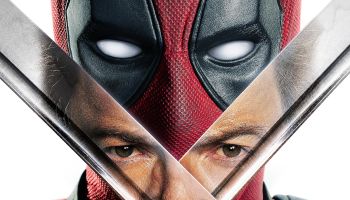Steve Stoute is it, take notes. The Queens-bred brand-marketing guru will win you over with his New York accent combined with his self-made mogul intelligence. He’s turned his days of working as a road manager for Kid ‘n Play into running a music empire before becoming the CEO of Translation, a next generation marketing, advertising and branding agency that emphasizes the importance of relating to your consumer, not selling to them.
Simple? Yes, but also genius. He took Run DMC’s ability to sell out Adidas everywhere over 20 years ago and translated the idea into hugely successful ad campaigns like Jay-Z for HP and Lebron James for McDonald’s.
We wish our resumes looked like his. He’s also the Chairman and Lead Investor of this little company called Carol’s Daughter, ever heard of it? He’s formerly managed Nas and Mary J. Blige, he calls Jimmy Iovine a mentor, Diddy a lifelong friend and in return he has Jay-Z calling him a true visionary, even a genius.
His first book, The Tanning of America: How Hip-Hop Created a Culture That Rewrote the Rules of the New Economy comes out today, September 8, and is already a hot topic among industry heavyweights like Swizz Beatz, Diddy, LaLa, and Mary J. Blige.
Tanning is a handbook into the mindset of a new generation. It examines a new America where hip-hop culture and the mainstream have collided, influencing a generation to become permanently unified through a similar mindset. The ideas that he examines in this book are what have made his company so successful.
[pagebreak]
Global Grind: Just to start off, what compelled you to write this book? Don’t you feel like you’re giving away your secrets?
Steve Stoute: No, I don’t feel like I’m giving away secrets. I think it’s important that young marketers and advertisers know how the millennial is thinking, what culturally drives them. I think it’s just nothing more than insight into how to market to consumers in general. I never think about like, giving away my secrets is going to make other people competitive or whatever, I can’t get into that. I enjoy what I do for a living, I want to see everybody do well. There’s enough space for everybody to do well. So writing this book and speaking to the fact that there is a “tanned” America, I think it’s important that the communications start to reflect that.
Hip-hop has been such a huge influence on so many peoples’ lives. The idea of “The Tanning of America” is so real, but you’re the first person that has put a label on it, this “tanning” phenomenon.
A lot of people who have read the book have said that. A lot of this stuff is, I didn’t know, a lot of it’s obvious but no one has ever strung everything together. I’ve lived my whole life that way, stringing those stories together because I’ve seen it, I’ve watched it, everywhere I go, and it’s not just the music. What’s more important is the culture behind the music. I always say that the music is nothing more than the Trojan Horse that brought the culture; the swag, the way you dress, the way you rock your hat, ebonics, bling, the way you color your nails. It’s the way you approach a guy, the way his car looks, you know, what’s sexy. All of these things, and that’s the aspect that unified a nation, a generation of kids.
[pagebreak]
Do you consider yourself to be living the “American Dream?”
I don’t think I’m living the “American Dream.” When you don’t come from much and you’re aspiring everyday to get more, I think that’s what America was built on, the opportunity to get further and further in life. I’m happy that I have the right to do that, but, I never get caught up in the fact that it’s the “American Dream,” I feel more that it’s an obligation. My parents came from Trinidad and they worked really hard to get to America, buy a house in Queens and I feel like it’s my responsibility to push further.
With that being said, a tiny percentage of the American population owns such a massive percentage of our country’s wealth. Do you think this makes it more difficult to achieve the “American Dream” right now?
No, there’s been a lot of information that’s come out that has given everybody a different opportunity, that’s sort of evened the playing field, from an opportunity standpoint. Now, if you already have money or you already have the information to know how to do something, you clearly have an advantage, but I feel like what the internet has done is level the playing field between the haves and the people who want to have because the people who want to have can go on the internet with an idea and with a low cost of entry quickly gain scale. Look at all these bloggers who are making money cutting into the business that the magazines would have and the advertisers with the magazines would’ve had and these are people that are blogging, doing it from their house saying, “I have a point of view.” That person, if it wasn’t for the internet, who knows what they would’ve been doing with those same ideas.
[pagebreak]
Yeah, but within the music industry, do you think the internet lowers the quality of work people do and just overall saturates it?
Well, I think that the internet definitely has done a lot more than saturate the quality of music. It’s hurt the business model of music. At the same time, the music business was getting away with things they shouldn’t have been getting away with for a long time like forcing people to buy albums when they only liked two songs. There was a generation that paid $14.99 when all they liked was one song and they were forced to listen to the album. They probably didn’t even listen to the album, they just played that one song. I think there’s a balance between giving away the music for free, people taking their music for free and forcing people to buy the album. It’s not there yet but I think that the music business is comfortably finding a place where it can operate and grow and consumers get what they want.
Do you think within the music industry that the DJ’s are becoming the new celebrities?
Definitely. The DJ’s that are becoming the celebrities are the electronic DJ’s. The truth of the matter is that a lot of them are not just DJ’s, that’s probably not the right term for them, they’re actually producing music as well and they’re putting on a show. DJ is the word because they’re sitting behind two computers putting on that show but I think they’re more producers, Masters of Ceremony is the word, more than just DJ’s.
[pagebreak]
When you left the music industry to get into advertising you were at the top of your game. I know they say to become successful you have to take risks, but what was that like for you?
It was very risky for me because I was leaving a business that I knew really well and I was at the top of that business jumping into an industry that I didn’t know that well at all and I was hoping that I would be accepted, that I’d be able to figure out all the things I didn’t know quickly enough so that nobody could find out I didn’t know.
Why do you think you’ve been able to become so successful at both?
There’s something about when you come from nothing you have to be really resourceful, it forces you to be resourceful if you want to go forward, you’ve gotta make it happen and I never wanted to fail. There’s was a lot with like building Carol’s Daughter, running record companies, managing artists and building an advertising company and writing a book. All the things that I’ve done over the last 10 or 12 years of my life has all been driven by that fear to fail.
Even though you grew up in the era and knew a lot of about it, did you still have to do a lot of research for the book?
Oh yeah, a lot of research because you know it inherently but you still gotta get into the facts in order to prove it out. It’s not my memoirs, but I had to go interview the guys from MTV and you know, I had to get the facts, the facts matter a lot.
What do you think are three characteristics that all successful people share?
Working their asses off, they’re determined on what they want, they know what success looks like. Ignore noise. Things are just around buzzing in your ear to get you distracted but not letting those things distract you. And another thing? Accessibility. People have gotta be able to get you on the phone, you’ve gotta be reachable, always be available. So availability, persistence and ignoring noise.
[pagebreak]
In your book you talk about how credibility is everything. Could you expand on that?
Credibility is believability. Being successful is hard, having something sell well is hard, let’s start off with that as a true and factual statement. In the hierarchy of real success selling something that sells well but is not authentic, it’s not successful. It sold well, somebody made money but it can’t be that successful when success is when something is truly credible and yet it still sells a lot. So let’s talk about Beats By Dre, they’re everywhere. Everywhere! It was guys who came from the record business, Jimmy Iovine and Dre who started those headphones but it was authentic, Dre really made records that sounded the best so he knew what headphones really should sound like and Jimmy is a great marketer and they worked with Monster Cable which is a great, credible company and created this great business. There’s a lot of guys who are making headphones right now who nobody even, ya know, it means nothing. Headphones with a design on it or headphones with candy colors on it aren’t authentic. Dr. Dre makes great sounding music and he was able to make great sounding headphones, so you believe it. Authenticity is always the biggest thing. Look at T-Pain now, he had 20 records on the radio three years ago, T-Pain can’t get arrested at radio right now, that’s authenticity, or lack of it.
[pagebreak]
With the hip-hop culture being more mainstream now do you think that there’s really a need for a channel like BET?
I just had this conversation. If I had one wish it would be for BET to change their name to not BET, Black Entertainment Television, it’s no longer a needed acronym. I think they could have black programming, I think that we all should be much more invitational to everybody, let everybody know that they’re invited in the party. Now, there was a time when they needed to call it Black Entertainment Television because if they didn’t distinguish themselves they wouldn’t have been able to succeed in business, and I have much respect for the owners of that company and the senior management of that company but if there was one thing I could do I would change Black Entertainment Television, I would throw a big party celebrating the fact that we are now able to lose the “B.” Not that they were wrong, they were right, but we are now able to do it and I would change the name of the United Negro College Fund. I think the word negro is associated with the other “n” word and I think that generation that’s going to college is like ‘the United Negro College Fund is for me but I don’t even wanna use that word negro anymore like that words not for me, I don’t even associate with that term.’ I would change those two things.
[pagebreak]
Did you hear that Rolling Stone named Eminem the King of Hip-Hop? What’s your opinion on that?
I think Eminem sold a lot of records over his career. He’s an unbelievable artist and a phenomenon and we are all blessed to have his talents, for our generation to be able to hear and be a part of an artist with that level of talent but I don’t think he’s the king of hip-hop, I don’t think that he would call himself the king of hip-hop. I think Jay is the king of hip-hop, Jay deserves it. I think Eminem is a phenomenon, a genius songwriter, a genius lyricist and an incredible artist.
What’s you favorite song off Illmatic?
“Life’s A Bitch” and “Represent”
What about off Watch The Throne?
“N*ggas In Paris” and “New Day”
Your favorite place to go out in New York City?
I like Lavo.
Your favorite borough?
Queens
Anything else you want to address?
I think what Russell Simmons did in building a business structure around hip-hop makes him a pioneer. I think Russell Simmons is the Steve Jobs of hip-hop. Actually, he’s the Steve Jobs of hip-hop and yoga.
















